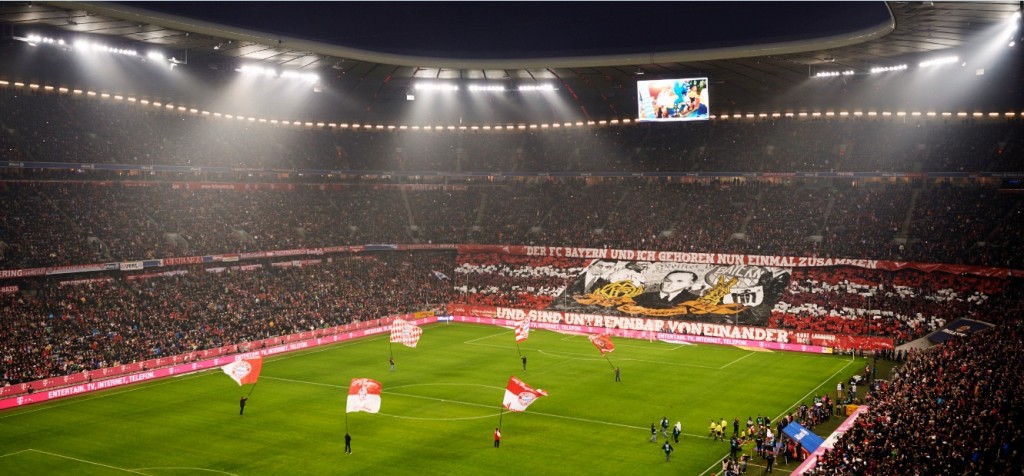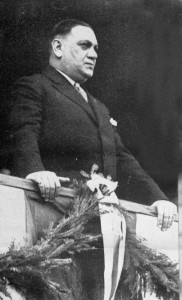Bayern Munich and its former President Kurt Landauer

What a year for Bayern! Sure, 2014 is still young and it’s not yet time for looking back. But it’s already clear that this will be a year
to remember for Munich’s iconic soccer club – for both good and bad reasons, on and off the field.
In March the Bavarians won this season’s Bundesliga championship with a 3-1 victory away at Hertha Berlin. Never in the history of German soccer had a club secured the championship trophy as early as March. It’s a history achievement for coach Pep Guardiola’s squad.
Bayern President Uli Hoeness’ tax evasion conviction preceded the all-decisive final whistle in Berlin’s Olympic Stadium by just a few days. He was sentenced to three and a half years behind bars. Afterwards Hoeness resigned all his positions at Bayern. As we’ve said, it’s already been a landmark year for Bayern, and it’s far from over. Last November, FC Bayern Munich posthumously named Kurt Landauer (1884-1961) its honorary president.
The story of Landauer and FC Bayern has to be told – and it will be, on the big screen. Later this year, “Landauer” hits German television with Josef Bierbichler in the title role. A TV documentary has also been announced. That’s after young filmmakers produced the documentary “Kick it like Kurt” in collaboration with Munich’s Documentation Center for the History of National Socialism.
An open spirit
Landauer, born in Planegg near Munich in 1884, the son of a Jewish merchant, was a Bayern member since 1901. He was a perfect fit for the club, founded in 1900. Excitement for soccer, which at the time was anything but universal, and rejection of gymnastics as “stuffy” united Bayern’s members, whether students or merchants, Christians or Jews. An open spirit held sway there. And no wonder. The club was based in Munich’s Schwabing district, in the early 1900s the home of artists, intellectuals and bohemians.
In 1913 Kurt Landauer became President of FC Bayern Munich for the first time, though his most successful and memorable period at the helm would come later, between 1919 and 1933. Only in 1922 did he take a sabbatical to straighten out his parents’ estate together with his brothers.
A global corporation in the making
Full of ideas and energy, Landauer led the Schwabing club onto the international sporting stage, and in doing so, laid the groundwork for the global corporation of today. The president strongly promoted youth training, and gave the side a modern, cosmopolitan streak. Exhibition matches abroad had aims besides international understanding: The German players had a lot to learn in international fixtures, and the club got the opportunity to strengthen its squad. For the job of Bayern’s first professional coach, Landauer signed up William Townley from England, the birthplace of soccer.
His hard work and creativity paid off. The Bavarians won the South German championship in 1926 and 1928, establishing themselves as equals to the then-dominant Franconian clubs Nuremberg and Fürth. Landauer’s biggest triumph came in 1932, when Bayern became German champions for the first time. Under their coach Richard Kohn, an Austrian Jew nicknamed “Little Dombi,” (Little Eminence) they prevailed 2-0 against Eintracht Frankfurt. Incidentally, the championship title was celebrated in Munich then just as it is to this day: with a parade on wheels through the city center, though back then it was mainly on horse-drawn carriages.
True fans
 And Bayern’s fans today have not forgotten to whom the club owed its first title. When, on February 2 this year, the latest edition of the June 12, 1932 title matchup was played against Eintracht Frankfurt, the Bayern bloc in Munich’s Allianz Arena’s South Curve unfurled an enormous banner with featuring Landauer’s likeness and a memorable quote: “FC Bayern and I simple belong together and are inseparable from one another.” It was a moment of goose bumps and profound emotion.
And Bayern’s fans today have not forgotten to whom the club owed its first title. When, on February 2 this year, the latest edition of the June 12, 1932 title matchup was played against Eintracht Frankfurt, the Bayern bloc in Munich’s Allianz Arena’s South Curve unfurled an enormous banner with featuring Landauer’s likeness and a memorable quote: “FC Bayern and I simple belong together and are inseparable from one another.” It was a moment of goose bumps and profound emotion.
History would demonstrate just how true this remark really was. Not even the Nazi dictatorship could permanently break this relationship. Adolf Hitler had hardly been German Chancellor for two months before Kurt Landauer resigned as Bayern’s president. He saw no other option. On November 10, 1938, after the pogrom night in Germany and along with many other Jewish natives of Munich, Kurt Landauer was arrested and taken to the Dachau Concentration Camp. But prisoner number 20009 was fortunate. He was freed after 33 days, “because as a former frontline soldier I was up for faster release,” Landauer would later recall. In 1939 he left Germany for Geneva.
Others who escaped to that city included soccer pioneer Walther Bensemann, a co-founder of Bayern Munich and the man behind “Der Kicker”, which would become Germany’s flagship soccer periodical and remains so to this day. Bensemann died in 1934.
Faithful players
Landauer’s time in Switzerland saw a reunion between the Bayern players and their former president. In a 1943 exhibition match between the Bavarians and Servette Geneva Landauer was in the stands in Geneva. The Bayern players ran to the seats and greeted him, much to the dismay of Nazi officials back home.
Two years after Germany’s liberation, Landauer returned to Munich. He was actually only passing through, but he stayed, and built Bayern Munich up, again as president, a second time. Today’s team captain Philipp Lahm was not exaggerating when he said that Bayern would not be where it is today – at the very top – were it not for Landauer. “Hardly anyone knows him yet, but the movie will change all that,” Lahm said. Kurt Landauer certainly deserves the recognition.
